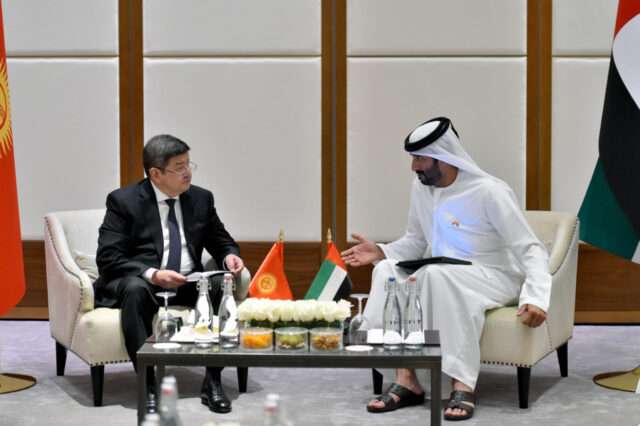Kyrgyzstan and the Middle East: Zhaparov discussed joint projects with UAE

Author: Giuliano Bifolchi
Zhaparov’s official visit to Abu Dhabi confirms Kyrgyzstan’s interest in developing an economic partnership with the United Arab Emirates and the Emirati desire to enhance its presence and influence in the Central Asian republic.
On December 12th, 2022, Prime Minister of the Republic of Kyrgyzstan Akylbek Zhaparov, arrived on a working visit to the United Arab Emirates, during which he met with the UAE Minister of Economy, Abdulla bin Touq Al Marri. Zhaparov emphasised that Bishkek wants to develop and further strengthen relations with the UAE and noted the high dynamics of the development of bilateral relations.
The Emirati Minister of Economy expressed the hope that the intergovernmental commission meeting would give a powerful impetus to accelerating the pace of cooperation between the two countries, both at the level of the public and private sectors.
Among other things, the parties discussed implementing major investment projects worth 800 million dollars. In particular, there is close cooperation with AD Ports Group in two areas: the reconstruction and construction of airports in Kyrgyzstan and the modernisation of customs and border posts.
Why does it matter?
- Kyrgyzstan needs to diversify its economic and political partners. Since the beginning of the Ukraine conflict and the following Western sanctions against the Russian Federation, Bishkek has increased its diplomatic activities to strengthen trade and political partnerships with regional and international actors with the final goal of diversifying and attracting foreign direct investments (FDIs). Indeed, Kyrgyzstan needs to find alternative solutions to the Russian influence and the heavy economic dependence on China. Therefore, the UAE might support Bishkek’s national economic strategy and foreign policy by investing in Kyrgyz infrastructural projects and connecting the Central Asian republics with the Gulf Arab monarchies.
- The United Arab Emirates is highly interested in Central Asia. The UAE is among the Gulf countries the most active in Central Asia. Abu Dhabi can use investments and trade to become an essential player in the economic development of Central Asian republics. From this perspective, the UAE has used the leading sovereign wealth fund Mubadala to invest copiously throughout Central Asia, especially in energy and port infrastructure. Due to recent geopolitical development in the Eurasian chessboard and considering the pandemic’s consequences on Central Asian economies, the UAE might help Central Asian republics with economic diversification and logistic development in a region which Russia and China have attempted to transform into a logistic hub.
- The UAE will increase its economic presence in Kyrgyzstan and Central Asia to counter other Gulf Arab monarchies’ local presence. Since Qatar and Saudi Arabia are actively promoting their presence in Central Asia through financial investments and supporting infrastructural projects, the UAE has used all the means possible to affirm their presence in this strategic area and counter its rivalries’ strategies. In this framework, it is possible to forecast a significant Emirati economic and religious involvement in Central Asia, interpreted by regional governments as an opportunity to diversify investments and decrease the international powers’ financial leverage.
- Since the U.S. troops’ withdrawal from Afghanistan and contemporarily with the beginning of the Ukraine conflict, Central Asia has attracted more international interest. Central Asia is still a ‘geopolitical battleground’ where Russia, China, Turkey, Iran, India, and the West seek to extend their influence. The Kremlin sees the region as part of its blizhnee zarubezhe (near abroad) and lebensraum (vital space). Therefore, since the ’90s, Moscow has attempted to strengthen its political and economic influence by establishing the Eurasian Economic Union (EAEU) and military presence by creating the Collective Security Treaty Organisation (CSTO). The recent “Central Asia – Russia” summit confirmed the Kremlin’s interests and economic pressure in the region and Moscow’s strategy to continue exerting its leadership in local dynamics. Since the launch of Beijing’s Belt and Road Initiative in 2013, China has hugely invested in Central Asian republics, and nowadays, regional countries are heavily financially dependent on the People’s Republic of China.
For further reports and analyses on Kyrgyz-Emirati relations and geopolitical dynamics in Central Asia, do not hesitate to contact us at info@specialeurasia.com.
